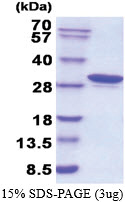Carbonic anhydrase 1 (1-261, His-tag) Human Protein
Other products for "CA1"
Specifications
| Product Data | |
| Species | Human |
| Expression Host | E. coli |
| Expression cDNA Clone or AA Sequence |
MGSSHHHHHH SSGLVPRGSH MASPDWGYDD KNGPEQWSKL YPIANGNNQS PVDIKTSETK HDTSLKPISV SYNPATAKEI INVGHSFHVN FEDNDNRSVL KGGPFSDSYR LFQFHFHWGS TNEHGSEHTV DGVKYSAELH VAHWNSAKYS SLAEAASKAD GLAVIGVLMK VGEANPKLQK VLDALQAIKT KGKRAPFTNF DPSTLLPSSL DFWTYPGSLT HPPLYESVTW IICKESISVS SEQLAQFRSL LSNVEGDNAV PMQHNNRPTQ PLKGRTVRAS F
|
| Tag | His-tag |
| Predicted MW | 31.0 kDa |
| Concentration | lot specific |
| Purity | >95% by SDS - PAGE |
| Presentation | Purified |
| Buffer | Presentation State: Purified State: Liquid purified protein Buffer System: 20 mM Tris-HCl buffer (pH 8.0) containing 1 mM DTT, 10% glycerol |
| Bioactivity | Specific: Specific activity is > 300 pmol/min/ug, and is defined as the amount of enzyme that hydrolyze 1.0 pmole of 4-nitrophenyl acetate to 4-nitrophenol per minute at pH 8.0 at 37C. |
| Preparation | Liquid purified protein |
| Storage | Store undiluted at 2-8°C for one week or (in aliquots) at -20°C to -80°C for longer. Avoid repeated freezing and thawing. |
| Stability | Shelf life: one year from despatch. |
| Reference Data | |
| RefSeq | NP_001122301 |
| Locus ID | 759 |
| UniProt ID | P00915, V9HWE3 |
| Cytogenetics | 8q21.2 |
| Synonyms | CA-I; CAB; Car1; HEL-S-11 |
| Summary | Carbonic anhydrases (CAs) are a large family of zinc metalloenzymes that catalyze the reversible hydration of carbon dioxide. They participate in a variety of biological processes, including respiration, calcification, acid-base balance, bone resorption, and the formation of aqueous humor, cerebrospinal fluid, saliva and gastric acid. They show extensive diversity in tissue distribution and in their subcellular localization. This CA1 gene is closely linked to the CA2 and CA3 genes on chromosome 8. It encodes a cytosolic protein that is found at the highest level in erythrocytes. Allelic variants of this gene have been described in some populations. Alternative splicing and the use of alternative promoters results in multiple transcript variants. [provided by RefSeq, Nov 2016] |
| Protein Families | Druggable Genome |
| Protein Pathways | Nitrogen metabolism |
Documents
| FAQs |
| SDS |
Resources
Recombinant Protein Resources |
{0} Product Review(s)
0 Product Review(s)
Submit review
Be the first one to submit a review
Product Citations
*Delivery time may vary from web posted schedule. Occasional delays may occur due to unforeseen
complexities in the preparation of your product. International customers may expect an additional 1-2 weeks
in shipping.






























































































































































































































































 Germany
Germany
 Japan
Japan
 United Kingdom
United Kingdom
 China
China
